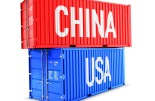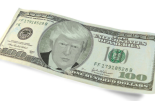AXA IM: Second-term Trump imposes risk of trade war between three blocks

'The US election’s potential impact on the Eurozone is rather binary – a Kamala Harris victory is unlikely to have a material effect, but a Donald Trump win would,' write AXA IM's François Cabau, Senior Economist (Euro Area) Macro Research and Hugo Le Damany, Economist (Euro Area) Macro Research.
Cabau and Le Damany explain that Donald trump aims to reduce the U.S. trade deficit, to which the Eurozone is a major contributor. In 2023, the Eurozone exported €450 billion of goods to the U.S., yielding a surplus of €133 billion. Trump has proposed a blanket 10% tariff on global imports, including those from the Eurozone, which would significantly raise export prices. The current weighted average tariff on EU exports to the U.S. is about 3%, and an additional 6.8% rise could reduce Eurozone exports by around €30 billion (0.2% of GDP). However, the impact might be mitigated by the depreciation of the euro, which could make Eurozone exports more competitive.
'We see a bigger indirect risk if a second-term Trump trade policy starts a trade war between the three main economic blocks. Trump has been even more aggressive towards China, threatening 60% tariffs. At the risk of oversimplifying, Chinese exporters would likely try to find a substitute market with similar consumers to the US; Europe would be the natural target,' Cabau and Le Damany add.
This would mean that a number of European industries, already in a tumultuous state, would face greater competition from Chinese producers, raising expectations of EU intervention with its own tariffs. However, the current negotiation on Chinese electric vehicle tariffs has shown the challenges of this. Cabau and Le Damany explain: 'Reaching an EU majority is complex, as each country’s interests differ. Furthermore, political stability in the Eurozone has significantly eroded since Trump’s first term and key elections loom in Germany (2025), Italy (2026) and France (2027 at the latest).'
'For the Eurozone, global protectionist policies, together with associated economic uncertainty would likely affect domestic and foreign investment. The impact is difficult to estimate but would be crucial for both short and medium-term growth,' they conclude.









